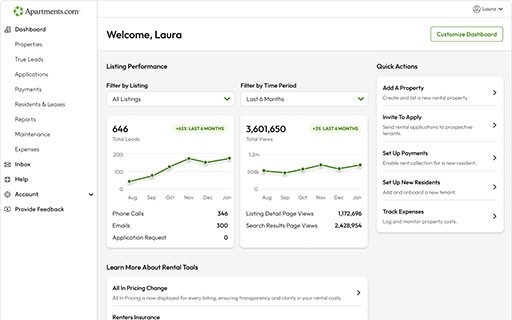
Managing rental properties in Washington State demands a solid grasp of the legal landscape. The Residential Landlord-Tenant Act (RLTA) governs your responsibilities and the rights of your tenants, and staying compliant with evolving regulations is key to maintaining a successful and lawful operation.
Let’s walk through the key aspects of Washington's rental laws and explore what’s required of landlords from lease agreements and security deposits to eviction procedures and significant legal updates for 2025.
Overview of rental law categories in Washington State
Overview of Rental Law Categories in Washington State
As a landlord in Washington, it's essential to understand the main categories of rental laws that govern your responsibilities and protect your interests. This section will break down and summarize key areas, including lease agreements, security deposit regulations, eviction procedures, and other critical aspects of property management. By familiarizing yourself with these categories, you can better navigate legal requirements and ensure successful, compliant rental operations.
Eviction procedures
Section RCW 59,12.030(3) of Washington’s Residential Landlord-Tenant Act, the eviction process begins with serving the appropriate written notice that matches the reason for termination—such as a 14-day notice for unpaid rent.
If the tenant does not comply within the specified period, landlords must file an unlawful detainer action in court, where both parties have an opportunity to present their case. Only after obtaining a Writ of Restitution from the court can a landlord request law enforcement to carry out the physical eviction.
Lease agreement rules
A residency longer than one year requires a written lease, according to Section RCW 59.18.210. A comprehensive written lease is highly suggested for any length of stay. It should clearly outline the essential terms of the tenancy, including the length of the lease, rent amount, payment schedule, and all fees or deposits required.
Landlords are also required to itemize any non-refundable fees and provide detailed information on rules and regulations that will govern the tenancy. Compliance with the law is critical, as certain disclosures and tenant protections must be included to ensure the agreement is enforceable. By taking the time to draft and maintain a thorough, legally compliant lease agreement, you can avoid misunderstandings, reduce the risk of disputes, and better protect your property interests.
Security deposits
Chapter 59.18 of Washington State landlord-tenant law mandates that all terms related to the security deposit, including the amount, purpose, and conditions for its return, be clearly stated in the rental agreement. Landlords are required to provide tenants with a detailed move-in condition checklist before accepting any deposit, which helps document the property's state and can prevent disputes later.
Security deposits must be held in a separate trust account at a recognized financial institution, and landlords must offer a written receipt indicating where the deposit is kept. When the tenancy ends, landlords have 30 days to return the deposit or deliver an itemized statement of deductions for unpaid rent or damages beyond normal wear and tear.
Fair housing compliance
Washington State landlords must comply with both federal and state fair housing laws to ensure equitable treatment of all tenants and applicants. The Washington Law Against Discrimination (WLAD) prohibits discrimination based on race, color, national origin, religion, sex, disability, familial status, sexual orientation, gender identity, marital status, and veteran or military status.
Landlords must apply consistent screening criteria and rental policies to all applicants and tenants, avoiding practices that could be seen as discriminatory. Additionally, landlords are required to make reasonable accommodations for tenants with disabilities, such as allowing service animals or modifying rental units to improve accessibility. By adhering to these fair housing requirements, landlords can foster inclusive communities, avoid legal disputes, and uphold ethical rental practices.
Maintenance and habitability requirements
Washington State law, under the Residential Landlord-Tenant Act (RLTA), Section 59.18.070, outlines clear maintenance and habitability requirements that landlords must meet to ensure rental properties are safe and livable.
Landlords are responsible for maintaining the structural integrity of the property, ensuring that it is free from hazards and complies with all applicable building and housing codes. This includes providing essential utilities such as heat, hot and cold water, and electricity, as well as ensuring that plumbing, electrical, and heating systems are in good working order. Landlords must also address pest infestations and ensure that common areas are clean and safe.
Failure to meet these obligations can result in legal consequences, including tenant remedies such as withholding rent or terminating the lease. By adhering to these requirements, landlords can avoid disputes and maintain compliance with state law.
What’s New in 2025: Legal Updates for Landlords in Washington State
The legal environment for rental housing is subject to change. There were key laws that went into effect in 2025 that all landlords should know:
Rent stabilization: RCW 59.18.140 specifies the mandatory notice period landlords must provide before increasing rent. For leases that expire after August 5, 2025, landlords are required to provide a 90-day notice.
Effective date: May 7, 2025
Rent increase cap limits: Washington’s House Bill 1217 states annual rent increases are limited to 7% plus inflation or 10%, whichever is lower. For mobile and manufactured homes, the cap is set at 5%. Landlords are also prohibited from raising rent during the first 12 months of tenancy.
Effective date: May 7, 2025
Compliance Tips for Landlords
To remain compliant with Washington State rental laws and new legislative updates, use the following steps:
- Update lease templates: Ensure all lease agreements reflect current legal requirements and include any new clauses mandated by recent legislation.
- Post mandatory disclosures: Clearly display or provide all required notices and disclosures to tenants, such as information about rent increases, tenants’ rights, and fee structures.
- Adjust fee structures: Review and revise application fees, deposits, and late fees to comply with state and local regulations.
- Train staff on fair housing: Educate all team members on fair housing laws, protected classes, and the importance of consistent, non-discriminatory practices.
- Document procedures for legal compliance: Establish clear procedures for move-in/move-out checklists, recordkeeping, notice delivery, and other critical processes to demonstrate compliance in case of a dispute.
Staying compliant with Washington State rental laws is essential for protecting your investment and maintaining positive relationships with tenants. By keeping up with legal updates and proactively adjusting your practices, you can avoid costly disputes, promote fair housing, and ensure your rental operations run smoothly. Being informed not only keeps you on the right side of the law but also builds trust and credibility within your community.
Frequently Asked Questions
What is the maximum amount I can charge for a security deposit?
Washington State does not set a specific limit on security deposits, but certain cities and counties within the state may have legal requirements. Contact legal resources within the local area for more information.
What’s the legal process for evicting a tenant in Washington State?
Washington State landlords must have a legally recognized reason to terminate a tenancy. Proper notice must be given, and the process must comply with the Residential Landlord-Tenant Act (RLTA).
This article is for informational purposes only and does not constitute legal or professional advice. For guidance specific to your situation, you should consult a qualified attorney or other relevant professionals.











